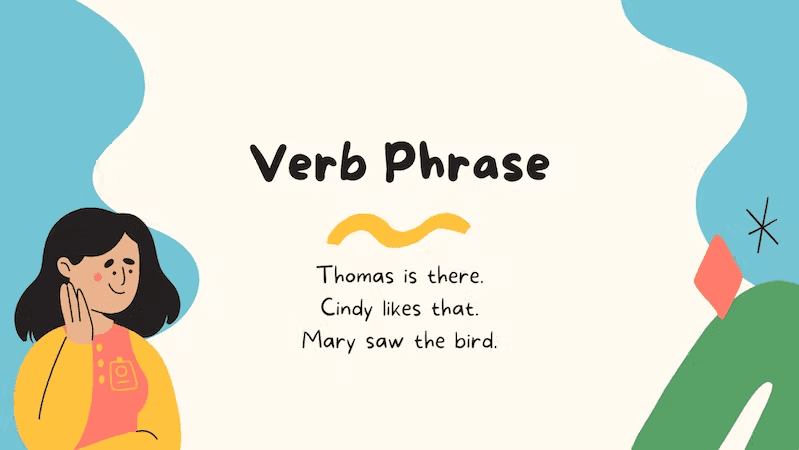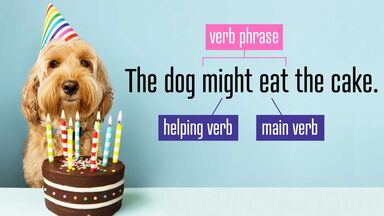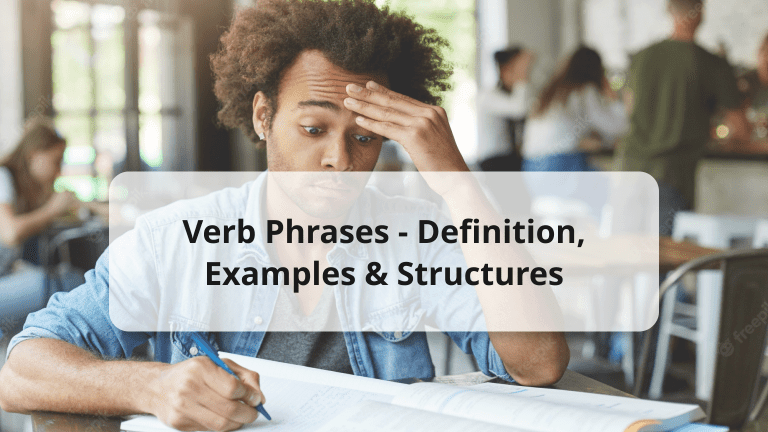Verb phrase
All words fall under one of the seven types of speech, verbs being one of them. Verbs are a part of speech that describes an action or state of being. What is a verb phrase, you ask? Well, it is simply a sentence containing a verb. There are 3 types of verbs that can be included in a phrase, the main verb is necessary but adding the auxiliary or modal verb is optional. The order of a verb phrase is the following: modal verb, auxiliary verb, and main verb.
Order of the verbs in a verb phrase
Below are examples of how the verbs fit together in the phrase. It is necessary for the verbs to fall under this exact order, otherwise, the sentence won’t make grammatical sense.
| subject | modal verb | auxiliary verb | main verb |
|---|---|---|---|
| He | left. | ||
| She | is | running. | |
| I | can | help. | |
| They | used to | date. | |
| I | could have | cried. | |
| We | are | eating. | |
| She | should have | been | working. |
| They | mustn’t | run. |
The thought of learning parts of speech might be daunting to you, but simply know that our AmazingTalker tutor team is here to assist you. Whether you want to learn about grammar rules for “the”, gerund phrases or if you want to start at the basics with some beginner English lessons, we will support you every step of the way. In this article, we will discuss the verbs in detail and show you how to use them below!

What is a verb?
Verbs represent a noun taking an action, having a thought, or being in a specific type of emotional state. Which means they can be tangible or non-tangible, either regular or irregular. Regular verbs mean that they have a past tense and past participle ending with -ed. Some words require a different structure because they are irregular, an example of this is the verb “run”, it does not turn into “runned”, it becomes “ran” in the past tense. Here are some verb phrase examples below:
| Base form | -ing form | Past tense | Past participle |
|---|---|---|---|
| Look | Looking | Looked | Looked |
| Watch | Watching | Watched | Watched |
| Work | Working | Worked | Worked |
| Fix | Fixing | Fixed | Fixed |
The auxiliary verb in a phrase
Auxiliary verbs can also be called helping verbs or linking verbs. There are different types of auxiliary verbs, the most popular ones are: To do, to be, and to have. Their role is to simply link the subject to the rest of the sentence to make it a verbal phrase. The sentence will include an auxiliary verb and the main verb, here are some examples of groups and verb phrases below:
- The “to do” form: do, does, did.
- The “to be” form: am, is, are, was, were.
- The “to have” form: have, has, had.
The auxiliary verb “be” examples:
| Auxiliary be | -ing form | |
|---|---|---|
| They | are | laughing |
| I | was | fighting |
| We | were | talking |
Was the question “is are a verb?” crossing your mind? Well, indeed it is, as you can see above! The type of ‘auxiliary be’ verb that is used tells us if it is past or present continuous. A verb phrase containing ‘was’ or ‘were’ are past continuous and a verb phrase containing ‘are’, ‘is’ or ‘am’ represents present continuous.
The auxiliary verb “have” examples:
| Auxiliary Have | Past participle | ||
|---|---|---|---|
| We | Have | Cooked | Dinner |
| She | Has | Hugged | Everyone |
| I | have | giggled | a lot |
Perfect aspect is expressed with the auxiliary verb ‘have’. The past perfect is indicated by ‘had’ and the present perfect is conveyed with ‘has’ or ‘have’. These sentences usually contain more than the auxiliary verb “be”, as you can see above.
The auxiliary verb “do” examples:
| Auxiliary do | ||
|---|---|---|
| Does | She | Run |
| Did | They | Eat |
| Do | you | smoke |
The verbs ‘does’ and ‘do’ fall under the present tense, whereas ‘did’ is the past tense. These sentences have the ability to be short and sweet.
Negative auxiliary examples:
| Negative auxiliary | ||
|---|---|---|
| They | aren’t | dancing. |
| She | Wasn’t | Sleeping. |
| We | Aren’t | Joining. |
Negative auxiliaries are relevant to each of the auxiliary types. ‘Don’t’, ‘isn’t’, and ‘doesn’t’ reflect present tense, and ‘didn’t’ and ‘wasn’t’ indicates the sentence is past tense, these are just a few examples of the negative auxiliaries.

Modal Verb in a Verb Phrase
A modal verb is a type of auxiliary verb. A phrase can include just a modal verb and the main verb, or it can include all 3 verbs: An auxiliary verb, a modal verb, and the main verb. This will depend on the sentence, what type of verb it is using, and if it is based on the present, past, or future tense.
As you can see above in the image with the dog, might is the modal verb, and eat is the main verb. The modal verb might indicate that it is a possibility and hasn’t happened yet.
What are modal verbs for?
Modal verbs indicate obligation, intent, possibility, or ability, it is a special type of verb because it has the ability to change or affect other verbs in a sentence. They are rather suggestive but can be factual in certain situations. These verbs might seem tricky at first, but they are actually quite simple. The most common modal verbs are:
- will
- would
- should
- could
- may
- must
- can
- might
This is simply a list of the highly popular modal verbs, there are a few more. Some modal verbs were very commonly used in history and were seen as a very polite way of speaking, but have now faded, such as ‘shall’ and ‘ought to’… I mean, when last did you hear someone use those words, right?
Please note that the past tense phrase ‘used to’ is unique and acts as a modal verb.
Where should we place the modal verb in a verb phrase?
The modal verb should be mentioned at the beginning of the sentence and will be based on the future tense, for the most part. The modal verbs are able to represent certain situations such as the following:
Ability
This shows if a subject is able to complete a specific task or not, through the verbs can and cannot.
- She can cook a delicious vegetable curry.
- He cannot ride a bike yet.
- I can now run 5kms in under 30 minutes!
Asking permission
This would come in the form of a question using the verbs can, may or could. The verb may is a traditional and more polite way of asking permission, but isn’t very commonly used in today’s day and age.
- Can we cancel our hike tomorrow?
- May I borrow your book?
- Could I please use your laptop to watch a movie?
Possibility
When something is possible but not set in stone. Verbs such as may, might, or could convey these situations.
- They may have their wedding this year, or next year.
- He might watch the movie with us tonight.
- She could be the first family member to move overseas.
Suggestion
A suggestion is more subtle than a command. You are not telling the person what to do, just telling them what you think they should do.
- You should wear sunblock at the beach.
- She should stop worrying about other people’s opinions.
- We should unpack and then make ourselves lunch.
Habit
The verbs “will” and “would” are applicable here as well as “used to” if you are describing a habit that no longer occurs.
- I will always exercise 5 times a week.
- I used to sleep in very late each morning.
- She will brush her teeth with her left hand.
Commands
The opposite of a suggestion. This type of modal verb is used when the action needs to be done for a specific reason. You would use “have to”, “need to”, or “must” when creating a command.
- You have to drink water every day for general health.
- She must bring a sleeping bag, a tent and a chair for this weekend’s trip.
- They need to buy a bag of chips and some dessert for tonight’s dinner.
Necessity
This can be called an obligation or duty, this modal verb describes an action that has to be done. It can also refer to an action that isn’t required when using the negative form of the modal verb. The verbs that are used are the same as the above.
- We have to cook all our vegetables tonight before they go off.
- They mustn’t touch the sculptures in the museum, it is against the rules.
- I need to finish my project before I can spend time with my friends.
Request
Similar to asking permission, this modal verb is a question, that asks someone else to do something, and starts with the following: will, would, can, or could.
- Would you mind putting the aircon on for me?
- Can you please transfer the money you owe me from last month?
- Will you please drop your sister off at school tomorrow?
Likelihood
This is used for a scenario when nothing is confirmed, but the action has the potential to happen. You will use the verbs should and must.
- He should be done with his project by Wednesday.
- You must be very frustrated because of your boss.
- They should be here in 10 minutes.
Phrase your way through life!
Now that you have learned all about verbal phrases, you should understand a key element of the English language. This article should’ve helped you build a good foundation, but if you want to improve your vocabulary, expand your capabilities and help you gain more confidence, check out some of the best English learning apps. If you aren’t sure about committing to set lessons through the apps but still want to check in and see where your English proficiency is then learn English online for free with these amazing sites!
English can be quite a complex language, as it is filled with unique sentence structures and rules, but don’t be disheartened! The tutors at AmazingTalker can guide you phrase by phrase and get you comfortable in a snap!
















